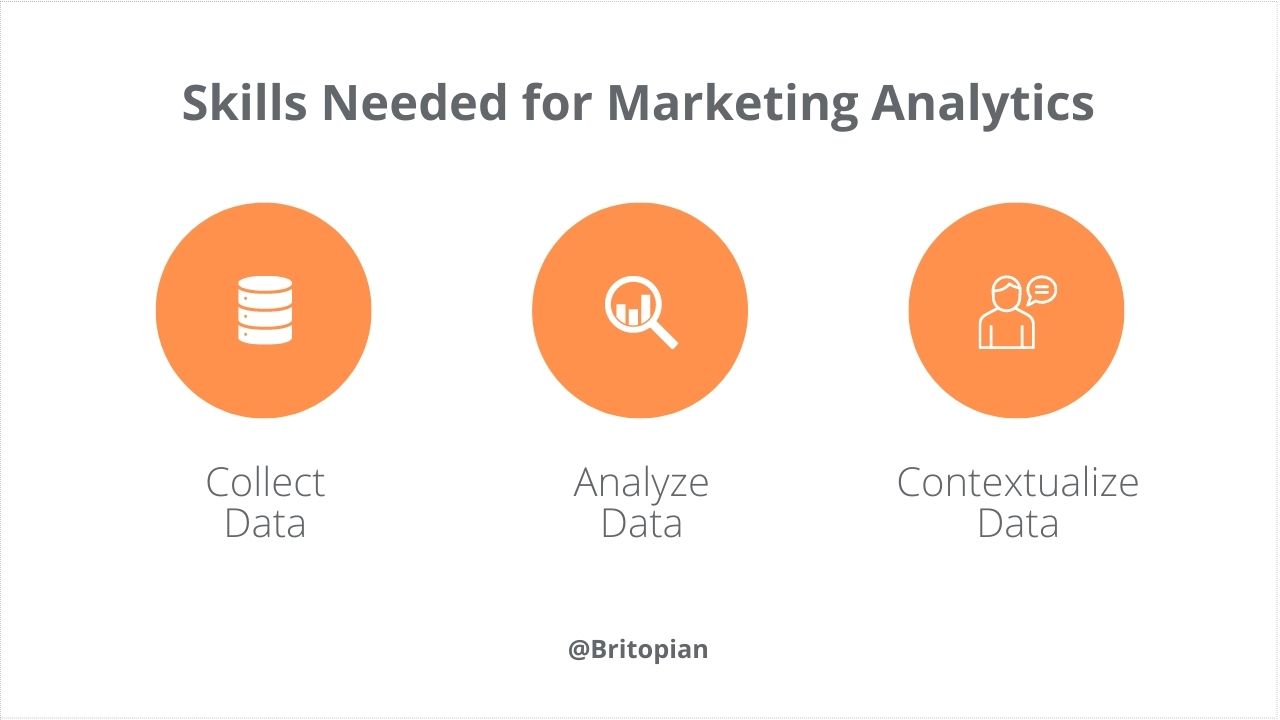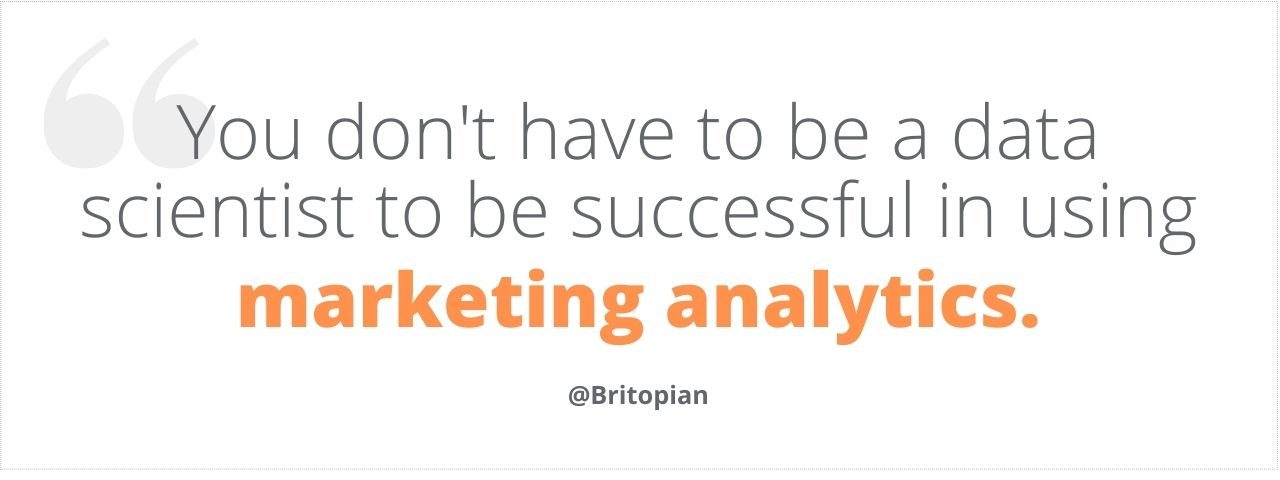To pursue a digital marketing career, you need strong analytics skills. This will help separate you from everyone else trying to get the same job or internship.
Marketing analytics helps you understand what’s working and what’s not, making more informed decisions about where to allocate your time, effort, and resources. Here’s what you need to know about marketing analytics skills, but let’s first talk about the role of marketing analytics.
Role of Marketing Analytics
Digital marketing analytics measures and analyzes digital marketing performance to optimize marketing campaigns and strategies. Marketing and brand analytics can track campaign results, understand customer behavior, and measure ROI.
There are three critical areas of marketing analytics–marketing performance measurement, marketing mix modeling, and customer segmentation and profiling.
- Marketing performance measurement is the process of tracking, analyzing, and reporting on marketing metrics to assess the effectiveness of marketing campaigns and strategies.
- Marketing mix modeling is a statistical technique used to optimize marketing campaigns by quantifying the impact of each marketing activity on sales. Marketing mix modeling uses historical data to predict future campaigns’ performance and helps marketers understand how each marketing activity contributes to ROI.
- Customer segmentation divides customers into groups based on shared values, interests, and characteristics. It is used to create targeted marketing campaigns more likely to resonate with each customer segment.
The role of marketing analytics continues to evolve, so you need to stay on top of the latest trends and continue to learn. There are a few different ways to think about the skills you need to acquire if you want to work in marketing analytics. There are technical skills and soft skills. Let’s first go through the technical marketing skills.
Digital Marketing Analytics Skills
First, you need to be able to learn how to collect and analyze data. This involves tracking website traffic, conversion rates, and social media engagement.
- Website traffic data includes page views, unique visitors, and bounce rate. This data can be collected using Google Analytics.
- Conversion rates are the number of people who take a desired action divided by the total number of people who see your offer. For example, if you have a conversion rate of 5%, that means five out of every 100 people who see your request take the desired action.
- Social media engagement data includes likes, comments, shares, and audience growth. This data can be collected using various social media analytics tools like Sprinklr or Infegy.
Second, you need to be able to analyze data. This involves understanding how to use Excel, business intelligence, or other data analysis software to make sense of your collected data. You can also use text analytics software to find trends and patterns. NodeXL Pro is an affordable option for students. This requires both Excel skills and critical thinking skills. You need to be able to look at the data and draw conclusions about what it means for your digital marketing strategy.

Third, you need to present data in a way that is easy for others to understand. This might involve creating charts, graphs, or reports using data visualization software. Also, you need to be able to communicate your findings. You can’t just send a report to a client without explaining the context. This involves being able to present your data clearly and concisely. It also requires explaining your analysis and recommendations in a way non-marketers can understand. Strong verbal, oral and visual communication skills are essential in marketing analytics.
Soft Skills for Marketing Analytics
You have to have the desire. This is self-explanatory, but you must embrace data and love it to make more informed decisions about PR, marketing, or content. Desire is something that you can’t create. You can’t take a desired course. You either have it or you don’t. So when I’m looking to hire new candidates, I’m always looking for that inner desire to use data to extract actionable data insights and make better-informed decisions.
You need patience. In any analytics project, 70% of the work is done by a human. In other words, an analyst or someone working with data will spend 70% of the time mining, blending, and cleaning the data, building charts and visualizing the data, and then writing insights. It’s critical to understand that you can’t report on the numbers without any context. Context comes from the human curation of data. This also means writing, testing, and re-writing Boolean logic.
You need platform experience. Dozens of technology providers can be used to track the media, and measure performance, audiences, and social media content. Let me name a couple. There is Muck Rack, Cision, and Meltwater media monitoring for earned media insights. For the last few years, I have been tracking all the top vendors in the traditional media monitoring space. It’s not a comprehensive list, but it’s a good start.
For monitoring social media, there’s Brandwatch, Synthesio, Infegy, and Pulsar. They each have differentiators in data, platforms, and how they collect data, report on it, and visualize it. They also have different mechanics for navigating the platforms related to queries, dashboards, and searches. I’ve also been tracking the top vendors in the social media monitoring space.
You need to be a storyteller. As with most job functions in marketing and PR, it’s critical to learn how to be a good storyteller. This is the same for working in digital marketing analytics. As I mentioned earlier, you need to have patience when working with marketing analytics because you are manually reading through loads of data.
It’s critical to go beyond just the numbers and provide context for the data. This is where being a good storyteller comes in. If you want to work for a public relations agency, there will be times when you might be pitching new business. And as we all know, most people don’t like to read spreadsheets or numbers. They want stories. So being able to turn data into a story is a very valuable skill.
If you decide to work for a brand, you’ll most likely have to report on the performance of your digital marketing campaigns to the C-suite. And let’s be honest, most of them don’t want to see a bunch of numbers either. They want to understand what the numbers mean for the business and how you will improve upon those numbers. So again, being able to turn data into a story is critical.
This skill won’t come immediately as it takes years of experience and a strong understanding of your client’s business, industry, and product. It’s important to include these skills when you are crafting your personal branding narrative.
Someone once told me that you had to be a data scientist to use data in your marketing job effectively. They are wrong. You can learn all of this. It takes time, patience, and experience, but it’s possible.

Final Thoughts on Skills for Marketing Analytics
The role of marketing analytics is constantly evolving. As the industry changes, so do the skills needed to succeed in this field. The most important thing to remember is that you desire to work with data, be patient when working with marketing analytics, and be a good storyteller. With these skills, you will be well on your way to a successful marketing analytics career. I highly recommend spending time taking the LinkedIn Skill Assessment so you can add the skills to your profile.
I’ve also outlined the top public relations skills you should master. You’ll notice much overlap between the two job functions, with data being the anchor. I would also recommend getting involved with LinkedIn Collective if you pursue a career in B2B. It’s a great resource that highlights the creative achievements of B2B marketers. It will also be important to stay up-to-date with the latest PR trends.
Related Content
